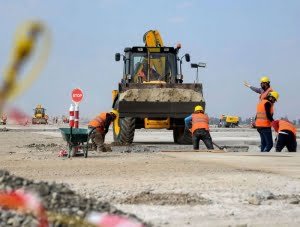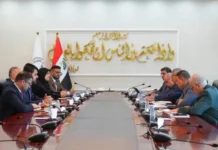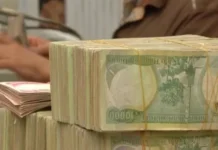
The recent increase in oil prices has given Iraqi Prime Minister Muhammad Shiaa Al-Sudani a chance to focus on development issues that were previously neglected due to a lack of financial resources. This includes industrial and agricultural development, which are important areas that the government has fallen behind on.
Experts in development affairs have suggested that policymakers in Iraq should not take the current financial abundance for granted, given the volatility of global energy markets. They urge investing it wisely through effective planning and safeguarding it against corruption, which has already swallowed hundreds of billions of dollars earned by Iraq from oil revenues over nearly two decades.
The surplus oil revenues present a rare and perhaps final opportunity to embark on a new path of development.
Recent estimates suggest that Iraq is currently earning over two billion dollars per month, which is above the projections used in the general budget. The budget was estimated based on a barrel price of 70 dollars, but now the price ranges between 85 and 90 dollars. This surplus provides financial stability to the Iraqi government and allows for the implementation of development projects in various fields, such as agriculture and industry, as well as funding small projects that are crucial to local development.
During a meeting of the Supreme Commission for Coordination between the Governorates, chaired by Al-Sudani, the monthly progress of various projects was reviewed. The meeting also identified the most significant problems and obstacles that hinder the completion of these projects and proposed solutions to remove them. Additionally, the session approved the investment map for the governorates of Karbala and Diwaniyah, taking into account the observations from the Technical Affairs Department in the Coordinating Body between the Governorates. Al-Sudani emphasized the importance of implementing his previous directives, which prioritize investment in industrial and agricultural projects in all governorates. This is due to their significant impact in providing job opportunities and supporting the development goals targeted by the government in its plans and programs.
During the meeting, several issues related to various development aspects were discussed. These included the provision of a suitable school environment for students, ensuring the availability of potable water in schools, and providing a decent living for the segment of beneficiaries of the social protection network. It was decided that these beneficiaries would be included in the allocation of residential plots of land according to the guidelines set by the Ministry of Construction, Housing, and Municipalities. The decision will become public after approval.
During the meeting, the government discussed administrative reforms and formed a committee led by the General Coordinator for Governorate Affairs, including the Minister of Finance, three governorates, and the National Investment Authority. The committee will determine the powers that will be transferred to the directors of sub-departments affiliated with the State Real Estate Department in the governorates.
In September of last year, Al-Sudani expressed concern that Iraq was struggling to finance its sustainable development goals. He highlighted that the financial losses incurred during the war against ISIS had contributed to some of these challenges. He emphasized the importance of prioritizing the financing of climate action, considering that Iraq is one of the countries most vulnerable to the impact of climate change.
During the Sustainable Development Goals Summit in New York, Al-Sudani reiterated Iraq’s commitment to the action plan of the International Conference on Financing for Development held in Addis Ababa in 2015. He emphasized the importance of developing integrated national financing frameworks to complement national development strategies. Al-Sudani also welcomed the summit’s adoption of the political declaration that emphasizes the urgent need to work seriously towards accelerating the implementation of the development goals for sustainable development.
Observers believe that Iraq’s increased revenue from higher oil prices is no longer a valid excuse for lack of funds, particularly for climate change-related issues.
Auk Lootsma, the Special Representative of the United Nations Development Program in Iraq, stated that Iraq is significantly impacted by the consequences of climate change, particularly due to the decrease in water levels. The United Nations is actively collaborating with the Iraqi government to increase the flow of water into the country.
In addition to lower water levels, climate change in Iraq is causing a range of other problems, such as rising temperatures, loss of biodiversity, sand and dust storms, and electricity shortages, all of which are affecting the daily lives of many Iraqis. Lootsma has emphasized that these issues cannot be ignored, as they have serious consequences for the country and its residents.
Lootsma emphasized that Iraq has prioritized addressing climate change, as it is part of the national development agenda led by Al-Sudani.
Financial abundance offers Iraq an opportunity to overcome developmental stagnation, provided it is shielded from the scourge of corruption that has consumed significant sums of money.
The United Nations Development Program created a national development plan for Iraq to follow between 2018 and 2022. The goal was to achieve sustainable development and focus on the most important areas for Iraq’s development. These areas include improving governance, strengthening the private sector, post-conflict reconstruction and development, improving the business and investment environment, increasing exports of basic goods, increasing agricultural and industrial production, and improving financial and monetary integration with capital markets. Unfortunately, the plan failed due to a lack of funds.
Al-Sudani had vowed to transform the economy from a rentier one by modernizing its functions and focusing on the potential of the youth in establishing small and medium-sized companies in various sectors such as agriculture, industry, information technology, services, and the environment. This will lead to job creation and will also attract both local and foreign investments.
Many believe that the surplus oil revenues present a unique and possibly final opportunity to embark on a new development path that rejuvenates agriculture and industry while also tackling the impact of climate change. It is important to act now before prices start to fluctuate again or the costs of the government’s “operating budget” consume resources and have a negative impact on the environment.




